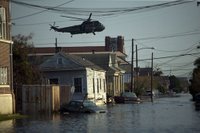Old Wives Tales
 It has been widely stated and reported that few of south Louisiana and New Orleans residents bother to get flood insurance. However, The Times-Picayune reports that south Louisana has one of the highest rates of participation in the National Flood Insurance Program.
It has been widely stated and reported that few of south Louisiana and New Orleans residents bother to get flood insurance. However, The Times-Picayune reports that south Louisana has one of the highest rates of participation in the National Flood Insurance Program.
In the immediate aftermath of Hurricane Katrina, public officials and insurance experts predicted that the vast majority of property losses from the most costly flood in U.S. history would be uninsured.Members of Congress rose up in righteous indignation to scold residents of New Orleans, one of the most vulnerable cities in America, for failing to buy federal flood insurance and then coming hat in hand and asking to be bailed out with federal money.
The irony, now revealed in data painstakingly worked up by aides to Donald Powell, the Bush administration's liaison to the disaster zone, is that Louisiana was a more enthusiastic participant in the National Flood Insurance Program than any other state in the nation.
Even researchers at the Cato Institue have been caught-up in the herd mentality.
"Although flood insurance is heavily subsidized, many -- even most -- property owners in New Orleans do not buy this insurance, expecting the federal government to bail them out whether or not they are insured," said Cato Institute Chairman William Niskanen in testimony to Congress about the disaster in September.
Niskanen was wrong about New Orleans. And like New Orleans, the rest of state also participates heavily in the flood insurance program.
Of the 113,053 single-family homes in Louisiana that sustained hurricane-related flood damage in 2005, at least 72,787 -- 64.4 percent -- were covered by flood insurance, according to Powell's data.
By comparison, just 30 percent of the 28,800 flooded homes in Mississippi had flood insurance.
In fact, neighboring Jefferson Parish has the highest rate in the nation with 84% participation in the flood insurance program.
One of the reasons that those who were not insured were not required to carry flood insurance based on the flood maps developed by FEMA. So the federal government decides which areas are high risk and which areas are not. As far as who lives in a flood plain, unless you live atop a mountain, everyone lives in a flood plain. Its just that some flood plains are at higher risk of flooding than others. And when politicians and bureacrats criticize us for being stupid enough to live in a flood plain that we should be condemned to our fate, we should ask them what flood plain they live in.

No comments:
Post a Comment